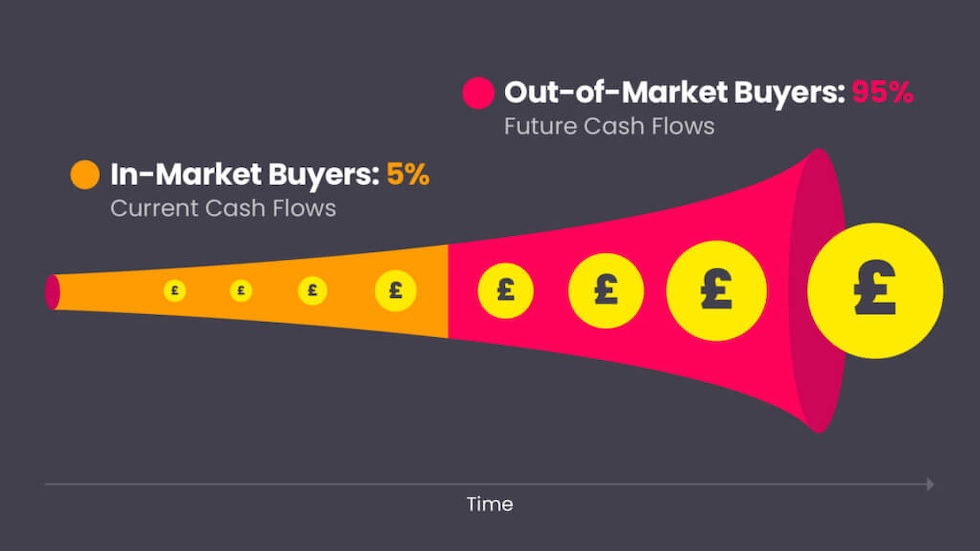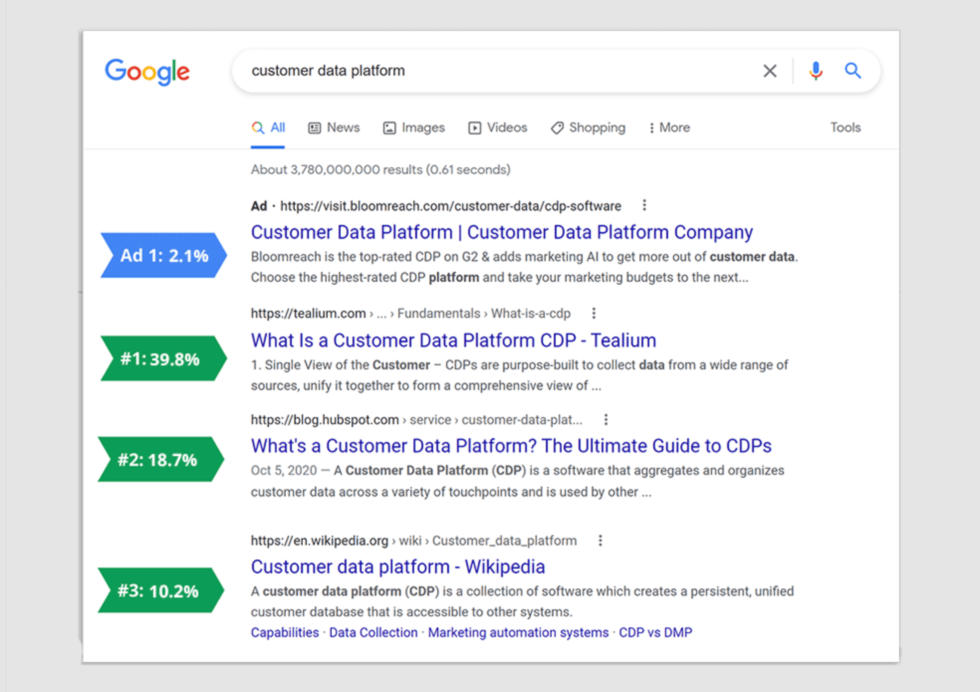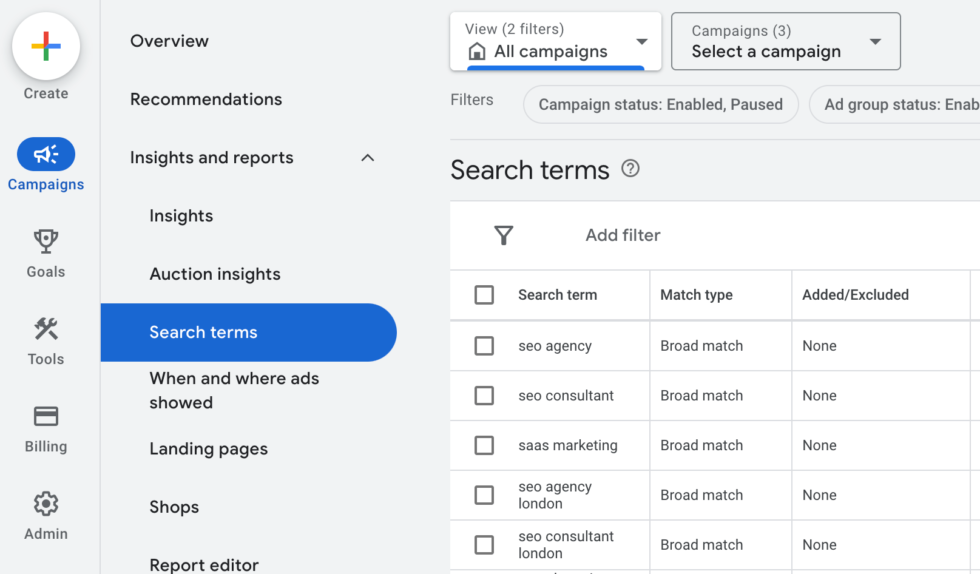The Benefits of PPC and SEO Working Together
Alastair Kane Search Marketing, Search Marketing PartnerRead it in 8 minutes
Read it in 8 minutes
Table of contents
Search engine optimisation (SEO) and pay-per-click (PPC) advertising are the two main approaches for improving visibility in the SERP (Search Engine Results Page).
While SEO focuses on organic search results, PPC allows businesses to show ads that are displayed on the results page.
In this post we’ll examine why SEO and PPC are important for B2B companies and the benefits of SEO and PPC working together.
SEO plays an important role in B2B digital marketing. It helps businesses increase their online visibility and attract potential customers.
With the right B2B SEO strategy in place, businesses can improve their website’s visibility for terms that drive more targeted traffic. This ultimately generates more leads and sales.
SEO improves visibility at the top and bottom of the funnel. Any B2B SEO strategy focused on ROI, should prioritise increasing visibility for keywords with buyer intent first, as these are the terms that drive sales.
Optimising for buyer intent keywords involves tasks such as:
Keywords with informational intent are also important as they help a business increase its brand awareness to an audience that is currently not in-market. Tactics that improve informational keyword visibility include:
It is widely accepted that only 5% of a B2B audience is in-market at any one time. You can therefore appreciate why B2B content marketing is crucial for reaching all potential customers.

A well rounded SEO strategy should aim to increase visibility for both informational and buyer terms so search visibility is maximised across the entire buyer journey.
PPC provides numerous advantages for B2B marketers. It allows them to target prospects who are actively searching for products and services on Google. This targeted approach helps B2B businesses connect with potential customers, thereby generating leads and business opportunities from search.
Another benefit of PPC to B2B marketers is that it’s highly measurable and enables businesses to monitor important metrics like click-through rates, conversion rates, and customer acquisition costs.
This data empowers companies to evaluate campaign effectiveness and make necessary adjustments to enhance performance and increase ROI. Furthermore, PPC delivers quick outcomes, enabling B2B enterprises to drive immediate traffic and leads.
A key benefit of using SEO and PPC together is enhanced visibility in search for a brand.
Ads take up valuable SERP real estate at the top of the page. Organic results are displayed below the paid results.
Showing up in both paid and organic search results reinforces your brand’s credibility and authority in the eyes of users.
People often perceive websites that appear in both areas as more trustworthy and established. This dual presence signals that your business is a key player in your industry.
It should be noted that organic results garner more trust amongst search engine users. Research indicates that the number 1 organic result has an average CTR of around 40%, whereas search ads average 2%.

This may be explained by the fact that people tend to trust results that have been ‘earned’ rather than ‘bought’. The only real requirement for entry into the paid search results is having the necessary funds, whereas entry into the organic positions often requires effort.
SEO is a long-term investment that requires time before yielding results. PPC on the other hand is almost instantaneous – as soon as you switch on your campaigns you are more or less visible on page 1.
While waiting for SEO efforts to gain traction, businesses can opt to run PPC campaigns to appear for important commercial keywords. This strategy allows start-up companies to generate leads from search engines without having to wait 4-12 months for SEO results.
By complementing a long-term SEO strategy with PPC advertising, businesses can strike a balance between short-term visibility and long-term growth.
As organic search visibility improves over time, companies can gradually reduce their PPC spending and rely more on organic traffic for sustainable lead generation.
The Google Ads Search Terms Report provides a sample of keywords that deliver ad impressions and clicks from people who see your ads.

This PPC data offers valuable insights on keyword information for an SEO strategy. I would even go as far to say that it provides better data than your standard keyword research tools because it is effectively giving real time information.
Looking for keywords in the Search Terms Report that have a high number of impressions will provide you with terms that have high search volume and have the potential to drive relevant website traffic. Keywords that have a good conversion rate will give you important insights on terms that have buyer intent.
Running PPC prior to embarking on SEO, can be a good way to assess the value of investing in a long term SEO strategy. Your PPC keyword data will provide an idea of the cost benefits of having so-called ‘free’ (organic) visibility in search versus having to pay Google for the privilege each time you want to appear in the SERP.
When looking to enhance your webpage copy for conversions, one strategy is to analyse the ad copy from your best performing ads.
By identifying the language and messaging that entices visitors to convert, you can then incorporate similar copy into your webpage . This will help ensure that the page is using language that has proven to be successful in attracting and converting customers through PPC.
By aligning your webpage copy with the high performing PPC ads, you create a cohesive and compelling message that drives conversions and boosts your overall SEO strategy.
Running SEO and PPC simultaneously can safeguard your website’s search visibility should a Google update negatively impacting organic visibility.
While a good SEO strategy mitigates the risk of Google penalties, sometimes an update may lead to decreased SERP visibility. By running SEO and PPC, you can maintain a strong search presence and adapt to fluctuations in search engine algorithms.
Lead quality from Google Ads should be monitored closely in a CRM such as Hubspot. Just because a lead converts in Google Ads doesn’t mean it is valuable to your business!
Hubspot enables you to see which keywords are driving conversions. By filtering for MQLs and Opportunities, you will get an idea of the terms that drive real business value. Leads that are worthwhile following up.
This keyword information is not only useful for optimising PPC campaigns. It will also offer valuable insights for your SEO keyword strategy.
For instance, say you see that keyword 1 is responsible for driving the largest proportion of opportunities for your business. You can then prioritise your SEO efforts into increasing visibility for this term in organic search.
Conversely, if you find that keyword 2 attracts lots of poor leads, you may decide that this keyword is one to avoid.
Running SEO and PPC together contributes to a well-rounded search strategy that covers both long term and short term objectives.
SEO is great for establishing brand recognition in search and serves as a crucial demand generation strategy. On the contrary, PPC can deliver immediate high-intent keyword visibility necessary for lead generation.
Some businesses may be put off by the idea of SEO due to the high initial investment and length of time to see ROI. They want results fast, so opt for PPC rather than SEO.
Whilst this makes sense on a logical level (I need leads now) if you are invested in building a strong brand in search, a PPC only strategy doesn’t make good marketing (or business) sense.
Here is why:
A holistic approach is key for sustained success. Focusing solely on PPC may yield short-term gains but lacks the foundation for long-term growth and brand authority in search.
Sign up to receive B2B Search Marketing Insights direct to your inbox
Book a call to discuss your business' search marketing needs
Book a call